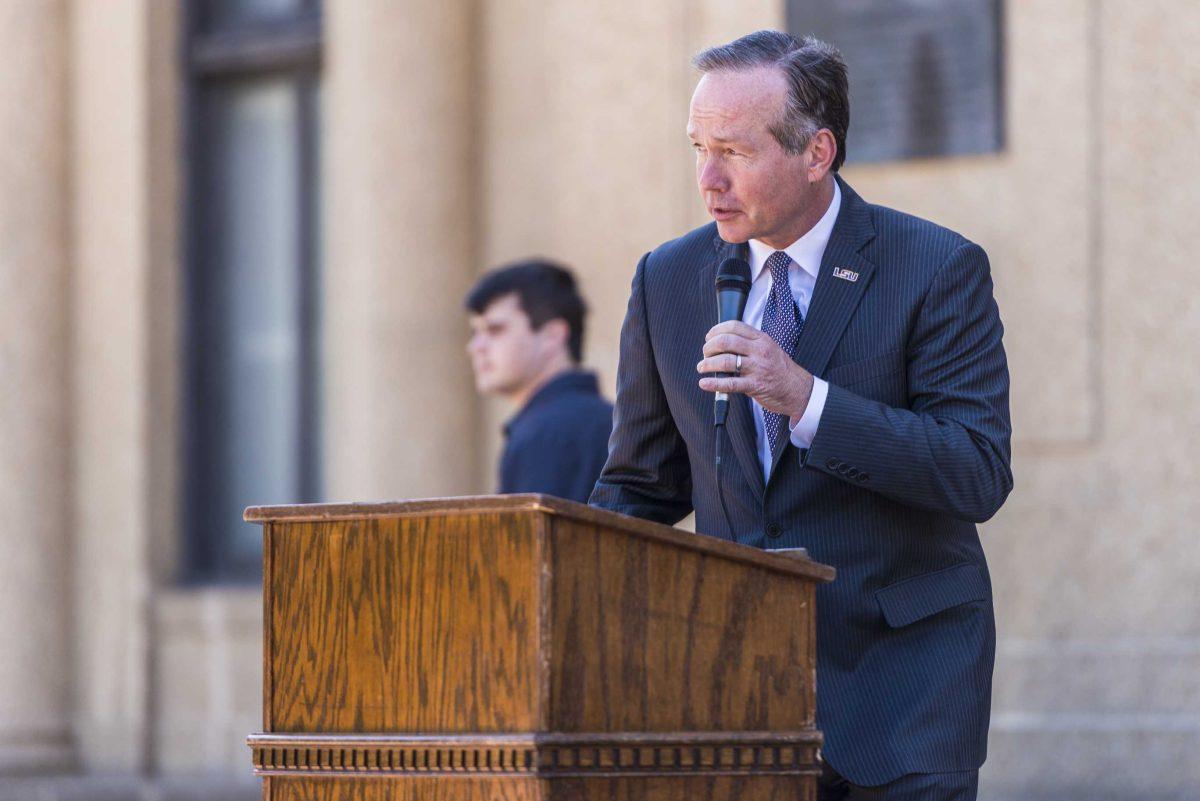On Dec. 13, 2019, former President F. King Alexander announced in a campus-wide email that he was leaving the university.
He left the university community with one note that still strikes me—”Please know that I will continue to fight for LSU in my capacity as a national advocate for public higher education.”
Our university had a true believer in public higher education as president, someone who was recognized on a national stage for standing up for the core beliefs of a public university. Throughout Alexander’s career as an educator, he has devoted himself to reforming the American public university model to accommodate the students who wouldn’t otherwise have the chance to attend institutions like LSU.
It was an argument on behalf of the students in the states he represented. In his first presidency job at Murray State University in rural Kentucky, Alexander was invited to testify in front of the U.S. House of Representatives on “college cost growth and student indebtedness.” The rural region served by Murray State needed a president who saw the true value in educating the population surrounding it—the core service mission of a public university.
It was the first of many times in which Alexander would be recognized for his passion and courage in saving the public university model. In 2006, he was appointed president at California State University, Long Beach, where he continued to be recognized as an advocate for the public university.
While at CSULB, Alexander led a “holistic” admissions policy that largely mirrors what he later implemented here at the university. This policy allowed incoming students flexibility on college entrance exams and GPA requirements. It is a large part of why he was one of the biggest critics of university rankings like those released by the U.S. News and World Report.
Alexander argues that it’s easy for a university to see success by only admitting the most qualified students, but that doesn’t serve the community.
“Everybody knows how to get graduation and retention rates up,” he said. “You turn down every academically-challenged student.”
If your university excludes such a large part of the population, then it is not a tool for community mobility. Universities should serve and uplift the community surrounding them.
In an interview with the Chronicle of Higher Education, Alexander said “becoming more exclusive would not help California.” He went on to explain that diverse state universities produce “teachers, engineers and nurses who stick around to work in the city of Long Beach,” while Ivy League institutions rarely contribute to the communities intimately surrounding their campuses.
If this all sounds familiar to you, it’s because it is. Alexander brought his passion for the public university model from Long Beach to Baton Rouge, yet sadly state politicians fought him every step of the way. He attempted to fight for adequate funding in the midst of the largest budget cuts in the country, as detailed in the Reveille last fall.
When Alexander warned of layoffs on the football team due to funding cuts that would shorten the academic calendar, he made plenty of enemies in the state legislature.
They were upset that he wasn’t willing to put their sacred cow first. The legislators would continue to see him as an enemy when he implemented holistic admissions, further opening the university to students across the state.
Today, amid numerous public scandals and accusations of mismanagement, the Board of Supervisors and other Baton Rouge power brokers have found their scapegoat in Alexander, who once described the Board as “athletics-obsessed.”
Alexander intimately detailed how the Board overreached to the Chronicle of Higher Education.
“He [the chairman of the Board] wrote down the numbers on a cocktail napkin…and said, ‘This is what we’re paying our new athletic director.’”
The university has spent much of the past several years protecting those who have cozied up to the Board and ignoring those who speak out—Alexander once challenged it.
I hope President William Tate IV will show that same courage when the time comes, and continue to uphold the belief in public higher education as our mission as a “scholarship first” institution would demand.
Charlie Stephens is a 21-year-old political communication junior from Baton Rouge.
Opinion: F. King Alexander was truly committed to public higher education
October 24, 2021
LSU President. F. King Alexander gives a speech during LSU’s 2018-19 Student Government inauguration on Wednesday, April 4, 2018, near Memorial Tower.





